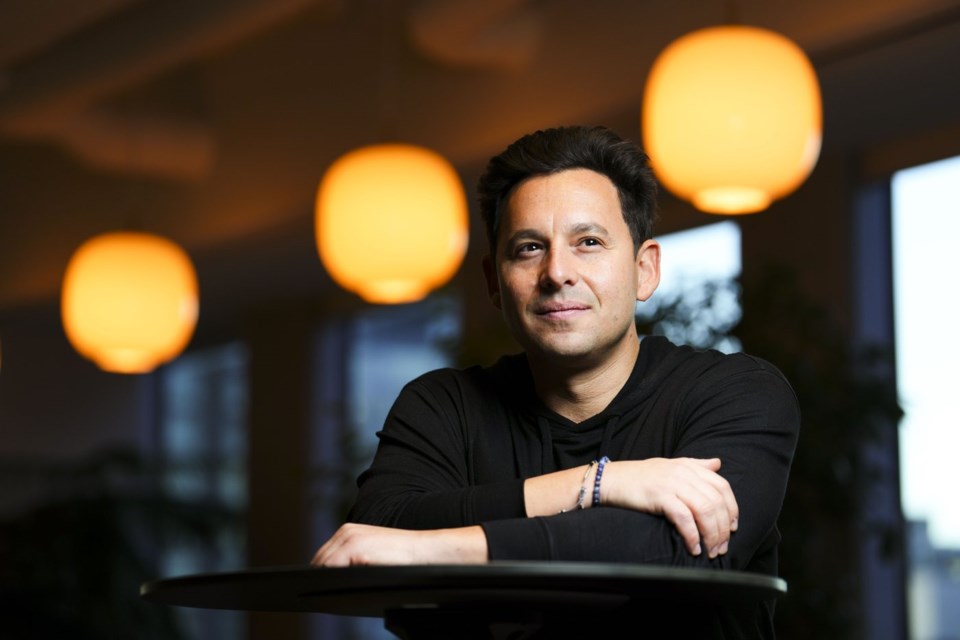TORONTO — A trio of the biggest names in tech say they resisted the allure of the U.S. — and cash-rich businesses that saw them as an acquisition target — and hope the next generation of Canadian entrepreneurs will do the same.
Shopify Inc. president Harley Finkelstein, Cohere co-founder Aidan Gomez and Wealthsimple CEO Michael Katchen said Tuesday that the future success of the country's tech ecosystem is largely dependent on entrepreneurs remaining in Canada.
“We have a desperate need to build Canada and to really reshape our economy and the only way to do that is through entrepreneurship,” said Katchen on Tuesday at the inaugural Toronto Tech Week.
Katchen said he moved back to Canada from the U.S. years ago in part because he was “deeply worried about the trajectory here.”
“We do two things here: we pull things out of the ground and we finance pulling things out of the ground,” he said, noting he didn’t want that to be the impression his kids had for Canada.
More recently, he and the other tech leaders acknowledged they’re seeing signs of a shift.
They’ve seen Canadian entrepreneurs across many industries lose their apologetic ways and adapt a more ambitious outlook. The challenge, they say, is ensuring that these entrepreneurs stay and build, rather than head for U.S. tech mecca Silicon Valley.
“That's really the issue I've seen (among) a lot of my peers at the University of Toronto and elsewhere,” Gomez said. “It's kind of that valley-or-bust mentality, which breaks the ecosystem and really hurts Canada.”
His observation was reflected in data. A 2018 study based on LinkedIn profiles of graduates from the Universities of Toronto, British Columbia and Waterloo in 2015 and 2016 revealed 66 per cent of software engineering and 30 per cent of computer science students were leaving Canada for work after graduation.
Gomez, whose company is one of the world’s buzziest AI firms, is no stranger to the temptations tech talent faces.
Long before chatbot ChatGPT sparked an explosion of AI innovation, he said Cohere received a nine-figure acquisition offer and was “very close” to taking it.
Now, he feels grateful Cohere ultimately turned the offer down and is “not for sale.”
“Any sort of exit that would take us out of Canada is only if we fail — and we haven't failed,” Gomez said.
“We're still growing super quickly, so I think acquisition is failure.”
He feels moving companies outside the country is just as unsavoury and said he’s coached entrepreneurs who write to him asking how to incorporate in Delaware to instead fight to appease venture capitalists to keep their Canadian headquarters.
It’s a move Finkelstein agreed with.
He said Shopify, an e-commerce software business and one of the country’s most valuable firms, felt similar pressure when it was raising a Series A round of funding.
Some investors made their funding conditional on a move south of the border but Shopify kept pushing and eventually found an investor group that didn’t care where they were based.
They kept looking for partners content to let them build in Canada as the business grew.
“The way that we resisted was we didn't return phone calls for mergers and acquisitions,” Finkelstein said.
“We knew that would start a cycle of conversation that would lead to a potential term sheet from some company for a lot of money saying we want to buy Shopify.”
Yet the assumption that entrepreneurs can’t avoid the U.S. for long still looms.
When he and Shopify CEO Tobi Lütke announced they were leaving their company’s hometown, Ottawa, Finkelstein said “the assumption was you’re going to the U.S.”
They were wrong. Lütke went to Toronto, where Shopify has a massive employee base.
Finkelstein headed back to Montreal, where he grew up, and doesn't regret it.
"The great decision I think I ever made was staying here," he said.
This report by The Canadian Press was first published June 24, 2025.
Companies in this story: (TSX:SHOP)
Tara Deschamps, The Canadian Press




